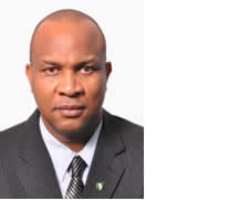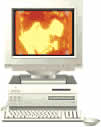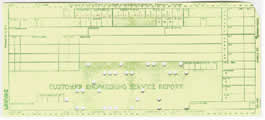ICT illiteracy in Nigerian Schools & Civil Service
– How do we bridge the digital divide?

In 1985, I unknowingly became part of the Computer & ICT revolution. While taking a course at a Community College in USA towards Associates in Arts degree, I fell in love with a “clunker” as the old machines were jovially called. Later, I moved on to obtain a Bachelors of Science degree in Computer Science and started working in in the industry. Back then in the 1980s, we were using punch cards, tapes for storage and writing programs in Assembly language and later FORTRAN & COBOL.
Before proceeding to graduate school to obtain a doctorate degree in Jurisprudence, I used to visit Nigeria and learn of students studying Computer Science in Nigerian Universities without even seeing a Computer and still graduating. That was over 20 years ago.
Now, let us look at a brief history of computers and ICT until 1985 when I entered the industry, to put things in perspective.

According to John Kopplin, the first computers were human beings, specifically women who were engaged in the repetitious and monotonous job of calculation. To curb the human errors involved in these calculations, scientists started researching for a mechanical replacement, leading to the analog & eventual digital device known as computers. What is called a “computer” or computing device is made up of various components, designed by many different people. In other words, a computer is an amalgamation of many technological parts, which makes it difficult to pinpoint its exact origin or give total credit to one person or company.
Several analog computers were constructed in ancient and medieval times to perform astronomical calculations. These include the Antikythera mechanism and the astrolabe from ancient Greece (c. 150–100 BC), which are generally regarded as the earliest known mechanical analog computers. Nonetheless, the first known partial human replacement or human-aid mechanical device was the abacus that dates back to 300 BC (some say 2400 BC) and was used by the Babylonians (not Chinese).

An original abacus
Thereafter, the Napier Bones, named after the 17th century Scotsman John Napier who invented logarithms in 1617. For our purpose here, a logarithm is just a method for doing multiplications using addition. Don't hit your head against the wall yet because we next have the SLIDE RULE invented in England in 1632.
To encourage our Nigerian youths, I must mention that Blaise Pascal, who at age 19, invented the PASCALINE in 1642. The Pascaline was a gear-driven one-function addition-only-calculator. I used to think it was a great accomplishment that I started university at 15, until I read about Pascal's exploits even at age 12. This was another replacement for us humans. One of the foremost programming languages was also named after him.
It is important here to mention that modern computers function using binary numbers (zeros and ones) instead of our decimal numbers. Think of them as off and on switches. The German Gottfried Wilhelm Leibniz was one of the great philosophers of his time that first advocated the use of binary numbers and also invented another human replacement calculating device called STEPPED RECKONER, which could do addition, subtraction, multiplication and division.
Moving on, the Frenchman Joseph Marie Jacquard invented the punched cards in 1801. We used these punch cards (at least a version of it) as computer operators & programmers, 184 years later in Florida. In fact, the election controversy in 2000 involving George Bush (Republican) and Al Gore (Democrats) was from the use of punch cards for voting. Out of that fiasco emanated the new dictionary phrase “hanging chads.” The State of Florida USA has remedied this problem and since moved to electronic voting.

A Punch card. Picture courtesy: www.computersciencelab.com
Around 1890, the US government used a machine (computer) called HOLLERITH DESK to conduct its census and saved a great amount of money. This machine was invented by Herman Hollerith who later started Tabulating Machine Company that later became known as International Business Machine (IBM).
Ada Byron (later the Countess Lady Lovelace by marriage) is reputed as the first computer programmer. In fact, in graduate school, the advanced programming language ADA is named after her. Although, she used notes form discussions with the English Charles Babbage in the 19th century, the programmable computer had not been invented. In fact, the first programmable computer was invented by Konrad Zuse. There is a dispute as to who or when the first commercially available truly analog computer (as opposed to calculator) came into existence, with some credit going to John Atanasoff & Clifford Berry of ABC sometime in 1942. However, for purposes of our article, we can narrow in down to between 1936 and 1942 before the Second World War. The point is that there were many analog computers, like those designed and built by Vannevar Bush before World War II. Thereafter, UNIVAC makes available the first commercial computer around 1951. Let's we forget, a little technology called the transistor, which affected computers, was invented about three years before, ushering the Second generation of computers. In 1953, International Business Machine popularly known as IBM enters the computer business and developed the first programming language called FORTRAN a year later. Thirty years later, I personally used this language while working for the State of Florida in the 1980s as a Computer Programmer before moving on to then big-8 accounting firm of Price Waterhouse.
The integrated circuits (computer chip) was invented around 1958 while the first bank industry computer came into use in 1959, although computer historians claimed it was invented around 1955. Third generation computers came in around the time Nigerian gained independence in 1960 and was ushered in by the invention of the computer chip. While Nigeria was engaged in the Biafra civil war, the original internet (ARPAnet) came into being in 1969. While today we here of flash drives, the first portable external storage device called “floppy disk” was invented in 1971, making easy to move data (information) around. The first consumer computer was made available in 1974 by at least two companies including IBM & Scelbi. That means that about 37 years ago, regular people like you and I, started owning computers in their homes.
By the time General Olusegun Obasanjo was handing over to Alhaji Shehu Shagari in 1979, the first word processing software called WordStar was already out in the market I the western world. Two years before General Buhari's coup, Bill Gates' Microsoft came out with the first operating system MS_DOS in 1981 and IBM started a personal computer revolution. Again, while IBB was planning his coup in 1985, Microsoft and Apple Computers were strategizing on who will be victorious in their friendly war. Just remember that today your phone is a computer and so are some refrigerators, microwave ovens, cameras and coffee makers.
Recently, I lectured law classes at a University in Nigeria, where surprisingly enough most of the lecturers (including the VC) were computer illiterates. That was in 2011. It was not uncommon to see the lecturers submitting their exam questions to the business centre for typing, leading of course to leakages or “expos.” It appeared unusual to some colleagues when I gave students assignments to be submitted via e-mail and required them to conduct research using the internet.
A secondary School contacted us in 2010 to conduct ICT training for their staff. Over the course of several weeks we walked them through creating an ICT based Scholl Environment, Educational Technology, Introduction to Computers & some advanced ICT courses. During those training, it was apparent that many teachers had never touched a desktop computer before, talk less of assembling or disassembly the components. Microsoft WORD to some of them was something spoken rather than the name of word processing software.
ICT is slightly different form Computers. Better said, ICT includes computers. The term ICT includes information technology, telecommunication, broadcast as well as computers. Apparently ICT was first used 1997 by Englishman Dennis Stevenson. Later the British government included it in their new 2000 National Curriculum. I will postulate that Computer Science is more rigorous and scientific than ICT education. In fact, many of us that started out in the scientific arena using assembly language and FORTRAN, found it difficult to cross over to the business side and start using COBOL & CICS. Same issues arose for those who wanted to move from minicomputers such as VAX and mainframe computers to IBM personal computers. However, such mobility from science applications to business applications is easier today because of the blurred line created sometimes by the Third generation computers.
All of the above mentioned scenarios, shows how far behind we are and how wide the technology gap is between us and the rest of the world. UNESCO has a publication on ICT in Education that sheds light on this subject matter.
To ameliorate the problem, the Federal Ministry of Education gave laptops to 360 students in secondary schools in Delta State in the latter part of 2011. There was no mention about how these recipients will be trained on its use.
On July 17, 2011, The President, Dr. Goodluck Ebele Jonathan GCFR, created a new Ministry of Communication Technology, which was charged with producing an ICT policy. The new Hon. Minister of Communication Technology, Mrs. Omobola Johnson formed an ad hoc committee on August 25, 2011, to harmonize the various laws dealing with ICT. I took the time to read through all 55 pages of National Information Communication Technology (ICT) Policy Draft by the Ministerial Committee on ICT Policy Harmonization, dated January 9, 2012.
In Section 3.1, of all the 12 objectives of the Policy, there is no mention of education. Many schools are ill-equipped. Even in section 4.5, it will be good to add the need for a benchmark to properly evaluate ICT curricula. I will suggest modifying section 4.2 (iv) to read “Education, Research and Development” changing it from RAD to ERAD or READ. There should also be a provision for the licensing of ICT practitioners. The current situation is porous and anyone can claim to be an ICT engineer or worse an ICT Expert. As someone who has been in the field since 1985 with a degree in Computer Information Science from the U.S. over 20 years ago, it is saddening. Also, as a lawyer, we should use this opportunity to create a comprehensive regulation of the industry. Furthermore, I had hoped that the Policy will also address issues of digital evidence and digital forensic, although section 4.2(v) mentions Cybercrime.
Nonetheless, I am happy and impressed by the bold move by the President and Honourable ICT Minister to harmonize our various ICT laws under one umbrella policy. Kudos is in order. It is good to see that the transformation agenda of President Jonathan includes ICT. We need various infrastructure including broadband internet access (at a minimum) to compete globally. This is a good beginning or good continuation.
Concerning NIPOST, I am in agreement that its regulatory function should be removed and NIPOST should be privatized or corporatized to increase its efficiency. On the section on Outsourcing (7.6), while English may be our official language, foreign companies will rather outsource to countries like India because of their reliable power sector and integrity. So, we have a long way. Even in the capacity building section (7.7), having lectured in a University in the United States and Nigeria, I discovered that the main obstacles to integrating ICT into the schools' curriculum are the outdated lectures and even anachronistic VCs, who have no ICT knowledge themselves.
It is good to have a harmonized ICT policy, but we should also look at ways to surmount the obstacles to the implementation of the policy.
To do this, especially in the education sector, we must understand the four major phases in the history of using computers in education. According to Dutch ICT blogger Gerry White, the phases are:
(1) Late 1970's – early 1980's: programming, drill and practice;
(2) Late 1980's – early 1990's: computer based training (CBT) with multimedia;
(3) Early 1990's: Internet-based training (IBT);
(4) Late 1990's – early 2000: e-Learning;
Nigeria is still far behind in the phases. National Open University (NOUN) may be the closest tertiary institution applying e-learning, but they still cannot compare to our overseas counterparts.
In The Pointer newspaper of Wednesday, February 1, 2012, I read with gladness that the Delta State government was going to invest money to computerize the secondary schools in preparation for JAMB's mandate that all exams will be computerized by 2013. Also, they were going to computerize the civil service. ICT curbs corruption and the civil service should embrace it. Concerning the students and JAMB, the biggest hurdles will be the teachers, who should first learn the software & hardware to be introduced before teaching the students. Otherwise, if the blind leads (teaches) the blind, you know what will happen.
With the current CBN cashless or “cash lite” policy, those who are ICT shy or ignorant will suffer. It is quite appalling that there are still graduates who don't even own ATM cards. Some Nigerians still believe in old wives' tales about prevalence of thefts of money through your ATM. How long will my people wallow in technology ignorance?
To bridge the digital divide, we need to massively invest in ICT literacy program similar to adult education program. In a blog post by a reader named Nick Kearney, two things are needed for real change in education: “one, for the technology to become increasingly ubiquitous, and as "invisible" as a light bulb (for many teachers any kind of classroom use of ICT remains exceptionally daunting) and that may take a generation, and two, for educational administrators and policy-makers to find ways to accommodate the implications of the learner-centredness involved. “ The technology is there but do we have the will power in Nigeria to adopt and implement it. For example, can we make it mandatory for teachers to present their lessons or lectures in PowerPoint and provide electricity during class?
As most "Teckies will tell you, technology is not value free, but reflects our values and dreams. If we dream of a better Nigeria, we will embrace ICT in our schools and civil service.
For Nigeria to be one of the 20 world economy by the year 2020, we cannot be ICT illiterates. Our people will embrace anything, if properly taught. This was clearly evident during the Voters Registration exercise in 2011. After the initial software glitches were fixed, many villagers were registering electronically using the DDC machines. Unfortunately, those that were looking forward to vote electronically were disappointed to learn otherwise. Our 2010 Electoral Act (Amended) Section 52 (1) (a) states: “The use of electronic voting machine for the time being is prohibited.” This clearly needs to be amended to encourage more ICT use. As mentioned above, the State of Florida and many parts of the world have moved on to using electronic voting for over a decade. We cannot afford to lag behind the rest of the world.
Those of us who are ICT literate or experts should join hands in educating those not fortunate enough to be exposed to ICT, Those who are ICT illiterate, especially teachers, should quickly get grounded or they will be left behind, or worse, pull us back.
The digital divide must be bridged! May God & Technology help us.
Credit for some research materials goes to www.About.com and John Kopplin © 2002. See also Ceruzzi, Paul E., A History of Modern Computing, MIT Press, 1998
Prof Alex O Atawa Akpodiete is an ICT expert, Educator, Consultant, Pastor, lawyer, Political & Social commentator. He has lectured Law, Ethics and Security & Intelligence Studies at the University level here in Nigeria and US. Prof AOA Akpodiete was also certified to teach Computer Science and Mathematics by the State of Florida. He currently divides his time between Nigeria and USA. Contact him on 08138391661 or [email protected].
